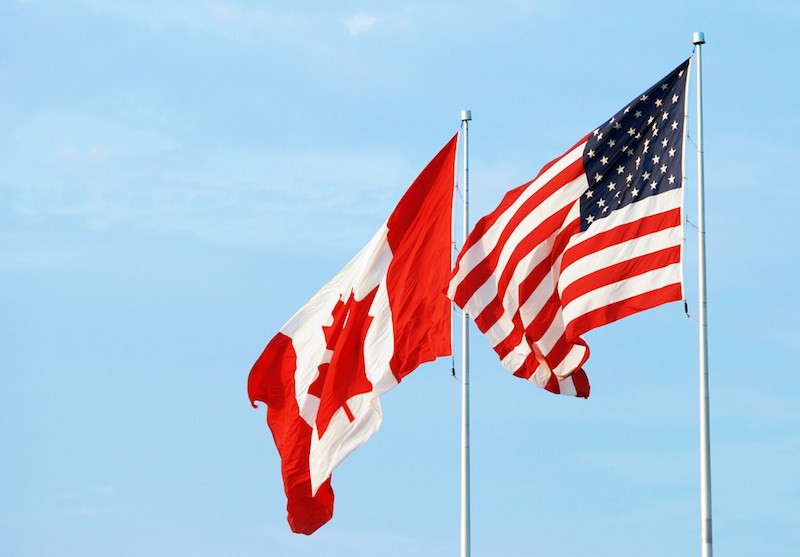This article, written by Florian Mayneris, Université du Québec à Montréal (UQAM) and Julien Martin, Université du Québec à Montréal (UQAM), originally appeared onThe Conversation and has been republished here with permission:
The current COVID-19 crisis reveals that most countries are vulnerable to foreign disruptions in the supply of medical products that are essential in the fight against the coronavirus.
Canada is no exception, as shown by the recent controversy over U.S. President Donald Trump asking the company 3M to stop exporting masks to Canada to ensure enough supply for the United States.
Even though the controversy had a relatively quick resolution and 3M masks will still be shipped to Canada, it is worth examining Canada’s dependence on the United States for medical products overall.
We have looked at information from COMTRADE, a database maintained by the United Nations that tracks the bilateral trade for almost 200 countries and 5,000 product categories. Some of these categories are broader than the specific products we’d like to consider, but they offer internationally comparable data.
Professional masks
Professional masks, such as the now famous N95 masks, are essential in the battle against COVID-19, but in Canada, most of them are imported. They appear in the COMTRADE product category as “breathing appliances and gas masks” and “protective masks” having no mechanical parts.
In 2018, Canada imported about $126 million and exported $54 million of professional masks. The U.S. is the largest exporter and accounts for 90 per cent of Canadian mask imports. This figure includes direct exports of masks produced in the U.S. and re-exports by the U.S. of masks produced in other countries.
Canadian imports of masks are not diversified across supplying countries, which explains the alarm of Canadian authorities after the Trump administration threatened to restrict the exports of these products. The U.S. and Canada eventually reached a deal that maintains the trade of masks, but the unpredictable decisions of the Trump administration might be directed to other key supplies in the future.
COVID-19 products
Beyond professional masks, the WTO recently published a list of products that are essential for tackling COVID-19. We tracked 75 of these products in COMTRADE data. Let’s call them COVID-19 products.
In Canada, COVID-19 products accounted for 3.9 per cent of total imports in 2018, compared to 5.8 per cent in the U.S. These products include medicinal products, immunological products, medical, surgical or dental instruments and plastic products, among which there are certain types of masks. The exact composition of COVID product imports differs in each country, reflecting their different manufacturing structures.
If we focus on the trade balance, or the difference between exports and imports, both countries had a trade deficit with the rest of the world — they imported more than they exported — for COVID-19 products in 2018.
Many COVID-19 products are bilaterally traded between the United States and Canada. In 2018, the U.S. represented 54 per cent of overall Canadian imports of COVID-19 products whereas Canada represented only six per cent of American COVID-19 product imports. Overall, Canada had a trade deficit for these products with the U.S. (though that’s not the case when we consider all manufacturing goods together).
The dependence of Canada on the U.S. is not limited to professional masks. The U.S. accounts for more than 75 per cent of Canadian imports for 32 COVID-19 products. Among those products, some are rarely exported by Canada, which suggests the country couldn’t easily substitute domestic production for foreign supply.
These products include medicines containing penicillin, photographic plates and films for X-rays, laboratory, hygienic or pharmaceutical glassware, syringes, needles and catheters.
Conversely, Canada accounts for at least 30 per cent of U.S. imports for only four COVID-19 products (hydrogen peroxide which is often used as an antiseptic, certain types of medicinal products containing antibiotics or vitamins and certain types of soap). Given its dependence on so many COVID products, Canada cannot afford an escalation of trade hostilities with the United States at the moment.
Nonetheless, the situation might not be as bleak as the numbers seem to suggest.
Masks in public
First, when the pandemic shutdowns are eventually relaxed, governments like Canada may continue to recommend that citizens don masks when grocery shopping or on public transit. Canada, particularly Québec, has a strong textile industry and could produce masks.
Second, Canada is also a key supplier to the United States for certain types of products needed in the fight against the coronavirus, as Prime Minister Justin Trudeau recently pointed out.
An example of this is the red cedar pulp used for the production of medical masks and gowns, which is currently mainly produced by Harmac Pacific in British Columbia.
The COMTRADE data also shows that Canada is a key supplier to the United States for some products that the U.S. does not export much itself to other countries, and therefore rarely produces. They include antibiotics other than penicillin, sterilizers for medical, surgical or laboratory use and electro-cardiographs.
In times of crisis, it’s easier to ensure quick deliveries, if necessary, with commercial partners that are geographically close and with whom we share a trusting relationship. And so maintaining a harmonious relationship between Canada and the U.S. is important for both countries.
The 3M controversy, although quickly resolved, starkly illustrated that Canada must find compromises with its southern neighbour about the trade of COVID products.![]()
Florian Mayneris, Associate professor, Université du Québec à Montréal (UQAM) and Julien Martin, Associate professor, ESG UQAM, Université du Québec à Montréal (UQAM)
This article is republished from The Conversation under a Creative Commons license. Read the original article.
